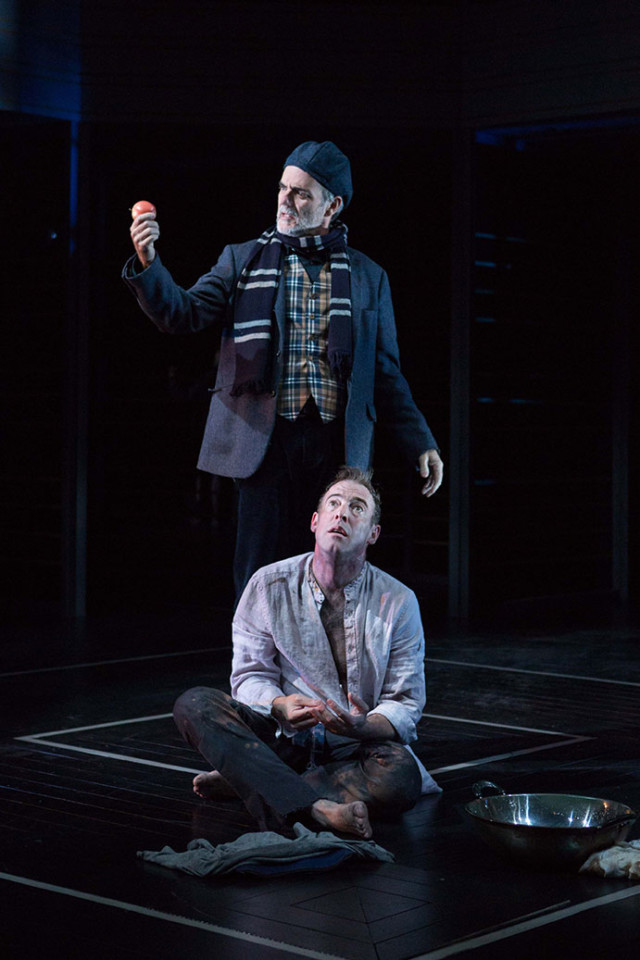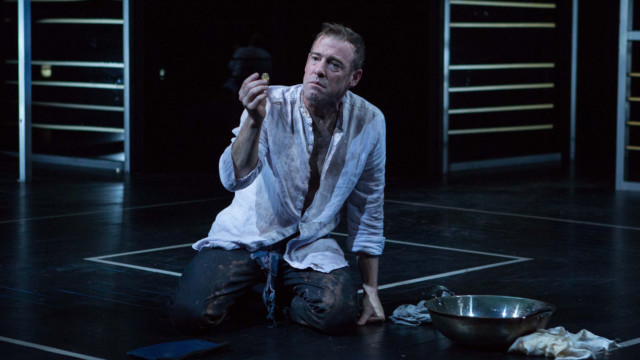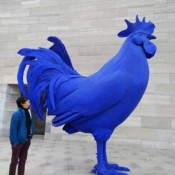We are mercurial, unpredictable creatures prone to inconsistencies and hysteria. Sometimes we appear to have everything together but underneath our stolid exterior lies an amorphous blob of anxiety- a mixture of insecurities, ignorance and fear.
On our good days we believe we can exert more control over our lives. Some of us are gracious. Others like Timon are generous to a fault. His penchant for giving excessive gifts to people who he considers his friends is what ultimately transforms him and his worldviews in one of Shakespeare’s lesser-known plays, Timon of Athens. But what it lacks in prominence, it makes up with a darkness that’s akin to Macbeth or King Lear’s Sturm und Drang.
Ahmad Coo is a producer and copy editor for the Global Business show on CGTN America. His analysis represents his views alone.
The play’s overall feel is set by the amazing Ian Merrill Peakes who plays Lord Timon. Without his performance I doubt the play being staged at the Folger Theater in Washington D.C. would have had as much gravitas as it had.
This particular iteration is set far in the future and given a hi-tech veneer. All the characters have smartphones and tablets just like today’s world- conceivably to inform the audience that Timon’s world and its concerns are applicable to any era. Moreover, it’s a closer look at the nature of human relationships and their extremely tenuous bonds.
In bountiful times, we believe in the goodness in people. We have faith that everyone is, at their core, altruistic. In those moments all is right in the world. This is foremost in Timon’s mind when the play opens. He and his assistant Flavius are preparing for an ostentatious dinner party for some of his closest friends. It’s also a chance for Timon to show off his magnanimity and the deepness of his pockets.
Of course, his dinner guests arrive and all of them are, not surprisingly, sycophants. They heap lavish praise on Timon for his generosity and call him one of the most honorable men in all of Athens. It’s motley crew of politicians, artists, hangers on, opportunistic entrepreneurs, and even an ex-convict. But their questionable backgrounds and notoriety matters not to Timon. To him, they’re all his true friends worthy of his attention and wealth.
But not all the dinner guests are showering him with compliments. The philosopher Apemantus is the only one willing to question Timon’s generosity and his guests sincerity. He’s a smart-aleck and offensive to the other guests but he is the only honest person in the room. In an aside to the audience, he talks about the bad faith beneath the false bonhomie shown by Timon’s guests. He tears them apart in his soliloquy saying these guests would ‘shut their doors against a setting sun.’

Philosopher Apemantus (Eric Hissom, top) addresses a lost and weary Timon (Ian Merrill Peakes) Photo by Teresa Wood
Apemantus says Timon’s guests are all false friends. To him, they’re irredeemably flawed humans. Sooner or later they will show their true colors- since Apemantus believes everyone on this earth will eventually betray their so-called friends and abandon them once they can no longer gain any benefit or advantage from them. Apemantus’ views about human beings are decidedly Augustinian: we are all wicked creatures capable of great evil. Timon will come to regret his choice of friends.
Timon’s world begins to unravel after we learn that his years of spendthrift ways have completely sapped his coffers and that his wealth is no more. His steward informs him that there’s no money to pay for debts and that he will lose everything. In desperation he turns to his friends to ask for help and sends Flavius to their homes. Apemantus’ prediction is spot on. None of his friends come through for him. As a final insult one of his ‘good’ friends turns his nose up on Timon’s good nature and works. ‘Everyman has his fault,’ Lucullus says with disdain, ‘honesty is his.’ Timon’s humiliation and rejection is complete.

“Undone by goodness.” Ian Merrill Peakes as Timon of Athens (Courtesy: Folger Theatre)
In the second act, we see a completely transformed Timon. He has fled his home and now lives in the forest. He is disheveled and seemingly mad. The times have also changed. Athens has been plunged into a civil war and desperation has taken hold of society. Opposing forces are fighting for control over a civilization in steep decline.
Timon, once a proud Athenian, now only wishes destruction for his once beautiful city. Gone is his belief in the good in man, replaced with hatred for their evil and pettiness. He’s visited by some of his former friends and they’re horrified with his complete transformation. Once a gracious, benevolent man- he’s become the ultimate cynic. Speaking to Alcibiades Timon says: “I am Misanthropos and hate mankind. For thy part, I do wish thou wert a dog, That I might love thee something.”
Somehow he recovers his wealth and just like before, he’s more than willing to give it away. But he’s doing so to further the destruction of Athens. Before his transformation, he loved humanity and showered his so-called friends with generosity and gifts. But in the second act, there’s nothing but spite and bile in his soul.
To Timon, humanity isn’t worth anything. He’s learned that the only thing that matters in such a world is wealth. He can bend people to his will with gold and proceeds to do so. He gives away gold to bandits, thieves and prostitutes. Only the wealthy are respected- and honor can bought. It’s a sentiment that reverberates through today. One just has to look at the political landscape of the United States to see that is painfully and irreversibly true.
 CGTN America
CGTN America
 Dinner at the home of Timon. Pictured left to right: Michael Dix Thomas, Sean Fri, Kathryn Tkel, Ian Merrill Peakes (center, as Timon), Andhy Mendez, Louis Butelli, and Maboud Ebrahimzadeh (with Eric Hissom top left) Courtesy: Folger Theater
Dinner at the home of Timon. Pictured left to right: Michael Dix Thomas, Sean Fri, Kathryn Tkel, Ian Merrill Peakes (center, as Timon), Andhy Mendez, Louis Butelli, and Maboud Ebrahimzadeh (with Eric Hissom top left) Courtesy: Folger Theater

